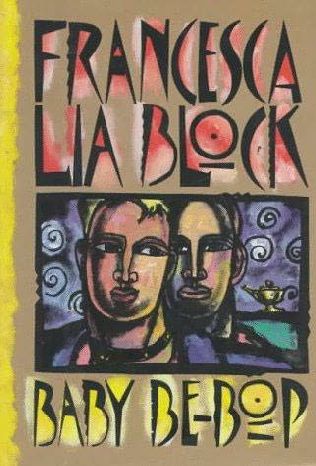To kick off my exciting new hobby, I decided to read the book whose entry on the ALA Challenged Book List confused me the most. Here it is in full:
Baby Be-Bop by Francesca Lia Block
Harper Collins
Four Wisconsin men belonging to the Christian Civil Liberties Union (CCLU) sought $30,000 apiece for emotional distress they suffered from the West Bend, Wis. Community Memorial Library (2009) for displaying a copy of the book. The claim states that “specific words used in the book are derogatory and slanderous to all males” and “the words can permeate violence and put one’s life in possible jeopardy, adults and children alike.” The CCLU called for the public burning of this title. Four months later, the library board unanimously voted 9-0 to maintain, “without removing, relocating, labeling, or otherwise restricting access,” this and other books challenged in the young adult section at the West Bend Community Memorial Library.
Here were the two parts that stood out to me the first time I saw this:
$30,000 apiece
public burning
$30,000?? Because the book was on display?? I can hear what you’re thinking. “What ‘specific words’? What can be worth $30,000 just if you happen to glance at it??? This book has got to be straight smut. That deserves to be publicly burned, like a witch or a Beatles record.”
Well, I’m sorry to disappoint you my friend. The words
$30,000 apiece
and
public burning
totally got my hopes up. This book did maybe not deserve either of these. Here is the basic plot, although, as a very lyrical novella, the word “plot” is used loosely:
Dirk McDonald knows that he’s gay. He’s known since he was young, when the carefree grandmother who raised him tells him it’s just a phase. He has a crush on his best friend Pup, but their relationship ends when Pup starts to date girls to hide his growing attraction to Dirk. “I love you, Dirk, but I can’t handle it.” Dirk lashes out, hiding his fear at himself and the seemingly cruel world around him by building himself an armor of punk rock persona and losing himself in music and violent dancing. Then one night after he tells some skinheads what he thinks about their swastika tattoos, he gets beaten up. Thus begins the much weirder second part of the book, where, in a weird dream/coma state Dirk’s great grandmother appears and tells him her story, and the story of his grandmother, and of his parents, two beat poets who “let go of life” one night in a car accident. Then at the end of the dream a genie appears and tells him about a man named Duck who, we’re supposed to presume, is his future love interest and reason to cling to life.
Aaaand that plot description was about five times racier than the book actually is. It’s only about 100 pages, and most of that is lyrical description. He doesn’t even say the word “gay” until he admits it to a ghost/hallucination of his father on page 86. There’s no sex, certainly nothing described graphically. Dirk mostly contents himself with yearningly thinking about kissing or just not being alone all the time. The word “faggot” is used a few times, mostly by the skinheads who beat him into unconsciousness. So I can’t really decide what “specific words” are “slanderous to all males”, especially if the people objecting and demanding $30,000 for emotional damage didn’t read the book carefully but only glanced through it since it was on display. Unless ladybugs and butterflies are slanderous to all men, because there WAS an awful lot of bug metaphors. Oh, and symbolic dancing. And beat poetry. So, yeah, public burning totes justified.
Seriously, I can’t even really find any “juicy parts” to quote. Unless you count this passage from the beginning, which is something he imagines while playing with his toy trains:
“He was on a train with the fathers–all naked and cookie-colored and laughing. There under the blasts of warm water spurting from the walls as the train moved slick through the land. All the bunching calf muscles dripping water and biceps full of power comforted Dirk. He tried to see his own father’s face but there was always too much steam.”
Later, he dreams of the same train, but instead of water coming out of the shower heads, it’s deadly, deadly gas. There’s a light sprinkling of anti-Nazism running through the book which seems slightly strange just because it remains unelaborated upon. I liked the language of this book. I was able to read it in about an hour, and it was almost like reading poetry. I was afraid it was going to be an angsty typical teen-problem novel, and, although the themes were similar, it had a very light touch, the exact opposite of the usual heavy-handed teen problem fare.

Obvious explanation: The people who sought the damages were nazis.